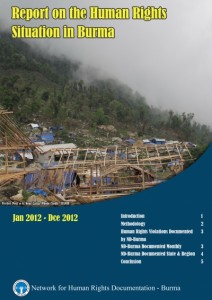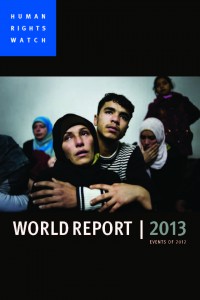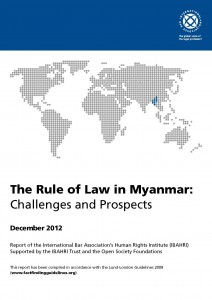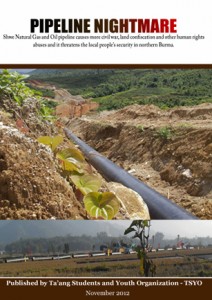Human Rights (383 found)
Human Rights Council: Maintain Scrutiny of Burma
International Pressure Needed on Minority Rights, Political Prisoners, Laws
The United Nations Human Rights Council should retain its current level of scrutiny of Burma’s still poor human rights situation, Human Rights Watch said today. The draft resolution on Burma for the council’s present session should continue the mandate […]
• • •Report of the Special Rapporteur on the Situation of Human Rights in Myanmar
The mandate of the Special Rapporteur on the situation of human rights in Myanmar was established pursuant to Commission on Human Rights resolution 1992/58, and was recently extended by Human Rights Council resolution 19/21. The present report is submitted pursuant to Council resolution 19/21 and General Assembly resolution 67/233, and covers human rights developments in Myanmar since the Special Rapporteur’s report to the Council (A/HRC/19/67) in March 2012 and to the Assembly (A/67/383) in October 2012 […]
• • •Burma/Myanmar: New Forms of Control and Threats to Freedoms of Expression, Assembly and Association Amidst Reforms Fanfare
An international fact-finding mission was conducted by Asian Forum for Human Rights and Development (FORUM-ASIA) on 24- 30 October 2012 to assess the situation of freedoms of expression, assembly and association in Burma, against the backdrop […]
• • •Losing Ground: Land Conflicts and Collective Action in Eastern Myanmar
Analysis of KHRG’s field information gathered between January 2011 and November 2012 in seven geographic research areas in eastern Myanmar indicates that natural resource extraction and development projects undertaken or facilitated by civil and military State authorities […]
• • •Report on the Human Rights Situation (January – December 2012)
 The annual report of Network for Human Rights Documentation – Burma (ND-Burma) documented the human rights situation in Burma from December 2011-January 2013. The report provides information on human rights violations (HRVs) over this period and highlights pressing issues and trends taking place in Burma. The annual report covers human rights violations in 16 categories over all 14 states. Unsurprisingly, the highest incidences of abuse occurred in ethnic nationality areas that remain in open conflict with the Burma Army, the Tatmawdaw, or are the grounds for controversial development projects […]
The annual report of Network for Human Rights Documentation – Burma (ND-Burma) documented the human rights situation in Burma from December 2011-January 2013. The report provides information on human rights violations (HRVs) over this period and highlights pressing issues and trends taking place in Burma. The annual report covers human rights violations in 16 categories over all 14 states. Unsurprisingly, the highest incidences of abuse occurred in ethnic nationality areas that remain in open conflict with the Burma Army, the Tatmawdaw, or are the grounds for controversial development projects […]
World Report 2013: Burma
 Burma’s human rights situation remained poor in 2012 despite noteworthy actions by the government toward political reform. In April, opposition leader Aung San Suu Kyi and her National League for Democracy party won 43 of 44 seats it contested in a parliamentary by-election; the parliament consists of 224 seats in the upper house and 440 in the lower house, the majority of which remain under the control of military representatives or former military officers
Burma’s human rights situation remained poor in 2012 despite noteworthy actions by the government toward political reform. In April, opposition leader Aung San Suu Kyi and her National League for Democracy party won 43 of 44 seats it contested in a parliamentary by-election; the parliament consists of 224 seats in the upper house and 440 in the lower house, the majority of which remain under the control of military representatives or former military officers
President Thein Sein welcomed back exiles during the year, and released nearly 400 political prisoners in five general prisoner amnesties, although several hundred are believed to remain in prison. Freed political prisoners face persecution, including restrictions on travel and education, and lack adequate psychosocial support. Activists who peacefully demonstrated in Rangoon in September have been charged […]
Chance for Change: Ending the Recruitment and Use of Child Soldiers in Myanmar
This report shows that despite nearly a decade of international engagement and the June 2012 signing of a Joint Action Plan to end the recruitment and use of children between the Myanmar government and the UN, children continue to be recruited and used as soldiers by the Tatmadaw Kyi […]
• • •Burmese Media Spring
This report examines the state of the changes carried out by the government and offers detailed recommendations designed to improve respect for freedom of information in Burma and ensure that the improvements are lasting […]
• • •The Rule of Law in Myanmar: Challenges and Prospects
 Myanmar is on the cusp of major reforms, but it needs to confront and overcome the legacy of its recent past if those reforms are to make progress. In order to understand Myanmar’s prospects and needs at this important juncture and, more specifically, to find out how far it has begun to adhere to globally prevalent understandings of the rule of law, the International Bar Association’s Human Rights Institute (IBAHRI) sent a delegation to the country’s major cities on a fact-finding mission between 11 and 18 August 2012. Its assessment and conclusions are laid out in this report […]
Myanmar is on the cusp of major reforms, but it needs to confront and overcome the legacy of its recent past if those reforms are to make progress. In order to understand Myanmar’s prospects and needs at this important juncture and, more specifically, to find out how far it has begun to adhere to globally prevalent understandings of the rule of law, the International Bar Association’s Human Rights Institute (IBAHRI) sent a delegation to the country’s major cities on a fact-finding mission between 11 and 18 August 2012. Its assessment and conclusions are laid out in this report […]
Pipeline Nightmare
 Shwe Pipeline Brings Land Confiscation, Militarization and Human Rights Violations to the Ta’ang People
Shwe Pipeline Brings Land Confiscation, Militarization and Human Rights Violations to the Ta’ang People
This report illustrates how the Shwe Gas and Oil Pipeline project, which will transport oil and gas across Burma to China, has resulted in the confiscation of people’s lands, forced labor, and increased military presence along the pipeline, affecting thousands of people […]
• • •
 All posts
All posts